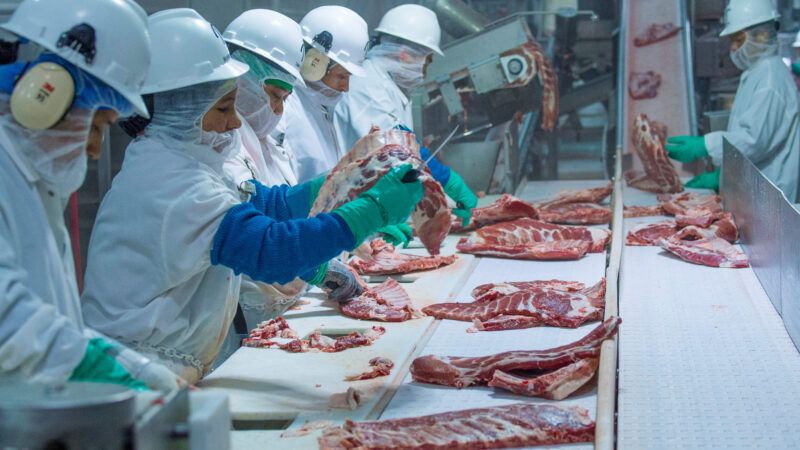Joe Biden Should Think Twice About Cracking Down on Meat-Processing Plants
Requiring meatpackers to pandemic-proof their facilities will have unintended consequences.

President-elect Joe Biden's administration will likely ramp up regulation of meatpackers after Covid-19 outbreaks spread through many of the nation's biggest processing plants, USA Today reported this week. While these facilities have not managed COVID-19 well, any new regulations will likely have unintended consequences.
As I explained in a May article on COVID-19 outbreaks at meat processing plants, these facilities necessarily require "hundreds of employees to stand elbow-to-elbow while working at breakneck speed." Social distancing? Not a chance. The sheer number of people working quickly and closely together is what likely turned these processing plants into daily superspreader events. Plants were forced to close temporarily after thousands of workers were sickened. Hundreds of those workers died.
The USA Today report says OSHA, the federal agency charged with regulating workplace safety, refused or failed to enforce its own guidelines to protect these meat-plant workers during the pandemic. And it suggests Biden will use a "heavier hand" to regulate the industry.
While the piece notes Biden has so far offered no specifics about any plans to increase plant regulations, it points to prior Biden critiques of the Trump administration's handling of plant worker safety during the pandemic, and calls for new workplace standards, hiring more OSHA inspectors, and requiring employers to ensure workers are socially distanced and provided with masks and other health and safety tools.
While some of those changes could happen quickly, one expert cited in the USA Today piece says implementing such wholesale changes would require "major legislation" to be passed. That's unlikely.
Whether or not the Biden administration's nebulous plans ultimately coalesce, I see at least three ways any such plans may cause workers to lose their jobs.
First, whichever rules the Biden administration might impose, if they reduce worker density at meat plants that are already operating at capacity, then there simply won't be room—or jobs—for all of the workers that currently staff these plants.
That's because meatpacking plants are designed to maximize output while complying with existing rules. Changing the rules means changing the plants. That's not easy.
"Please understand, processing plants were no more designed to operate in a pandemic than hospitals were designed to produce pork," meat processing giant Smithfield wrote in a public communication this past summer. "In other words, for better or worse, our plants are what they are. Four walls, engineered design, efficient use of space, etc. Spread out? OK. Where?"
That's not just some industry doublespeak. Douglas Trout, a Centers for Disease Control expert who focuses on workplace health and safety, told the industry publication Meatingplace recently he saw "no reason, necessarily, to have the occupational safety and health controls to prevent person-to-person spread of a virus like SARS-CoV-2 prior to this epidemic."
If decreased worker density becomes mandatory, the industry will need to build new plants to meet demand. But building dozens or more new plants won't happen anytime soon. The biggest plants cost hundreds of millions of dollars to build. Even a slightly smaller plant can cost tens of millions of dollars.
That's why these same processing plants may just decide it's cheaper, safer, and more efficient to replace most of their workers in their existing facilities with computer software and hardware.
Even before the pandemic, the news was rife with stories about a coming wave of meat-plant automation. Automated meat processing has the ability to make safer the dangerous business of cutting up livestock. And automation is more efficient.
But these reports have only grown in number since the pandemic ripped through the nation's largest processing plants. Meat plants that are using artificial intelligence have seen "remarkable advancements" in productivity. And highly automated plants, unsurprisingly, have had far fewer Covid-19 outbreaks among workers.
Robots can't do everything humans can do in a processing plant yet. But they can perform some key processing and packaging tasks, VentureBeat reported in August, and they can also "scan, weigh, and measure carcasses to eviscerate them 'intelligently,' with the more sophisticated models planning blade trajectories for cutting, separating meat from carcasses and boning them out."
Hopes and fears that robots and other automated systems will replace meat-industry workers are no pipe dream. Consider, for example, that the push for a $15 minimum wage is spurring the fast-food industry to replace human workers with cheaper automation.
Third, if one or more of the Covid-19 vaccines are successful—as I hope they will be soon—then any rules the Biden administration might draft could become moot by the time they take force. That doesn't mean, mind you, that any such rules would be scrapped. That would leave meat processors to comply with rules that—even if, charitably, they made sense at the time they were adopted—are costly, overbearing, and outdated. Frankly, though, such a situation would make those rules almost exactly like a lot of other meat regulations.
I'm one of the many people who noted during the pandemic that no worker's life, at any point in a supply chain, is worth sacrificing for a hamburger. I stand by that. But are those same workers' jobs worth sacrificing?
